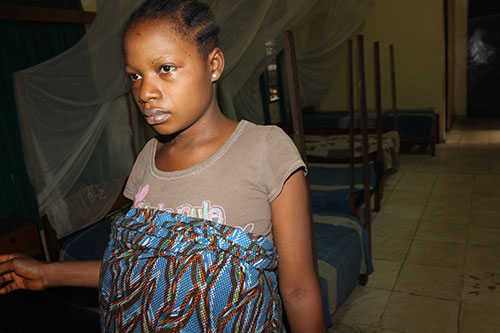Noticias
Liberia's Ebola outbreak leaves pregnant women stranded
- 26 Agosto 2014
Noticias
MONROVIA, Liberia – Ebola has devastated health systems in Liberia, where the outbreak appears to be intensifying. UNFPA is providing protective gear to health workers and safe delivery kits to health facilities, helping to restore access to life-saving care. Still, the situation remains dire.
Hardest hit

Ebola is one of the deadliest diseases to affect humans, with a fatality rate that can reach up to 90 per cent.
Although the death rate in this outbreak has been lower, its extensive reach has made this the deadliest occurrence of the disease since its discovery in 1976. Of the 2,615 cases in Guinea, Liberia, Nigeria and Sierra Leone, 1,427 people have died, according to recent estimates from the World Health Organization (WHO).
These latest figures indicate that Liberia may now be the hardest-hit country. In the short window between 19 and 20 August, 142 new cases were reported, 110 of which were in Liberia. On 6 August, in response to the outbreak, Liberian President Ellen Johnson Sirleaf declared a state of emergency.
Tragically, the disease is taking its greatest toll among those assisting the ill.
While there is no difference between women’s and men’s vulnerability to the disease, the burden of caring for sick family members traditionally falls on women, increasing their exposure to the disease. As a result, health officials have observed more deaths among Liberian women than men.
And across the affected countries, health workers have fallen ill in unprecedented numbers, according to WHO. In Liberia alone, some 117 health workers have been infected and 63 have died, according to a recent Government report.
Increasing maternal deaths
Health centres around the country have run out of obstetric gloves and personal protection equipment needed to prevent contamination.
Lack of these essential supplies, illness among health-care providers, and fear of infection among staff have all contributed to the widespread closure of health facilities, especially in Ebola-affected areas.

UNFPA responds
UNFPA is providing emergency reproductive health kits, including clean delivery kits, to health facilities, midwives and communities. These kits contain the medical supplies required to manage safe deliveries, and to address possible complications.
UNFPA is also procuring medical gloves to facilitate safe delivery while protecting health workers from possible infection. Disinfectants, protective gear such as heavy duty aprons, as well as hand-washing equipment are also being procured.
“We want to ensure quality reproductive health services – including safe deliveries – while promoting universal precautions in all health facilities,” said Philderald Pratt of UNFPA in Liberia.
Two UNFPA staff members are on the case management team of the Ministry of Health, providing on-the-spot training on case management, infection control, and the dissemination of information and supplies to health-care providers. UNFPA is also working with partners to ensure that communities are educated about Ebola prevention.
Ebola has been known to occur in regions of sub-Saharan Africa, though normally fewer than 500 cases take place each year. No cases at all were reported between 1979 and 1994.
– Calixte Hessou